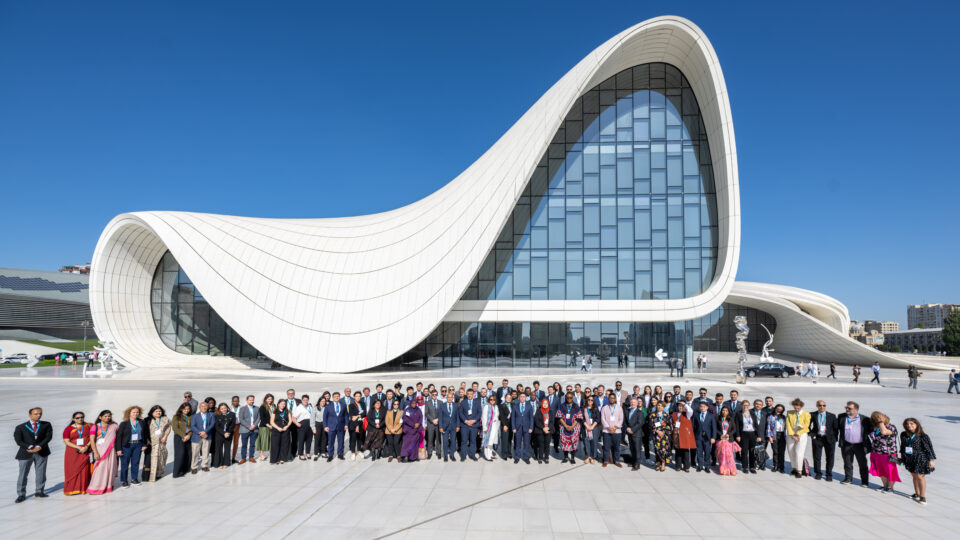
Von Öl- und Gas-Superprofiten zu Klimaschutzmaßnahmen: Die Überbrückung der Kluft auf der COP29
Die 29. Konferenz der Vertragsparteien (COP29) in Baku, Aserbaidschan, endete damit, dass die Klimafinanzierung in den Mittelpunkt gerückt wurde. Angesichts der doppelten Herausforderung für die Entwicklungsländer durch klimabedingte Katastrophen und den dringenden Übergang zu erneuerbaren Energien war die Debatte über finanzielle Zusagen noch nie so wichtig wie heute. Anushruti Kukreja schreibt über ihre Eindrücke von der COP29 und die notwendigen Schritte zur Überbrückung der Klimafinanzierungslücke.
Ein Beitrag von Anushruti Kukreja
Ein Schritt nach vorn, aber nicht genug
Die 29. Konferenz der Vertragsparteien (COP29) in Baku, Aserbaidschan, endete damit, dass die Klimafinanzierung in den Mittelpunkt gerückt wurde. Angesichts der doppelten Herausforderung, der sich die Entwicklungsländer durch klimabedingte Katastrophen und die dringende Umstellung auf erneuerbare Energien gegenübersehen, war die Debatte über finanzielle Zusagen noch nie so wichtig wie heute. Die Zusage der Industrieländer, bis 2035 jährlich 300 Milliarden Dollar bereitzustellen, stellt einen Fortschritt gegenüber dem bisherigen Ziel von 100 Milliarden Dollar dar. Bereinigt um die US-Inflation wäre der Wert der 100 Mrd. USD-Zusage für 2024 jedoch viel höher. Legt man die US-Inflationsrate (ca. 2,5 % jährlich) zugrunde (US Inflation Calculator, 2024), liegt der Gegenwert von 100 Mrd. USD für 2024 näher bei 140 Mrd. USD, was bedeutet, dass das 300-Milliarden-Dollar-Ziel nicht einmal die Verdreifachung der Zusage von 2009 erreicht und den gestiegenen klimabezogenen Bedarf der Entwicklungsländer noch immer nicht berücksichtigt (Abnett et al., 2024).
Viele Entwicklungsländer, darunter Indien und Brasilien, äußerten ihre Unzufriedenheit mit dem Abkommen und bezeichneten es als „optische Täuschung“ und „Brotkrumen“. Diese Länder argumentieren, dass angesichts des Ausmaßes ihrer Bedürfnisse 1,3 Billionen Dollar pro Jahr bis 2030 das Minimum sind, das erforderlich ist, um die Herausforderungen der Anpassung und Abschwächung zu bewältigen, denen sie gegenüberstehen (Jazeera, 2024). Daher wird auf der COP29 auf die Notwendigkeit innovativer Finanzierungsmechanismen hingewiesen, um die Finanzierungslücke zu schließen.
Im Zusammenhang mit diesen Diskussionen bezeichnete der Präsident der COP29, Ilham Alijew, Öl und Gas als „ein Geschenk Gottes“ (Rannard, 2024). Diese Aussage unterstreicht zwar die tief verwurzelte Bedeutung fossiler Brennstoffe in vielen Volkswirtschaften, wirft aber auch eine entscheidende Frage auf: Wenn Öl und Gas tatsächlich ein „Geschenk“ sind, sollte dann nicht die Öl- und Gasindustrie - die von diesen Ressourcen immens profitiert - verpflichtet werden, ihren gerechten Anteil an der Bewältigung der Klimakrise zu leisten, die sie mit verursacht hat?
Superprofite: Das fehlende Glied in der Klimafinanzierung
Das Papier „Harnessing Oil and Gas Superprofits for Climate Action“ schlägt eine überzeugende Lösung für dieses Defizit vor, indem die massiven Superprofite der Öl- und Gasindustrie umgelenkt werden. Aufgrund der geopolitischen Spannungen haben die Unternehmen der fossilen Energiewirtschaft im Jahr 2022 über 490 Milliarden Dollar an Supergewinnen erzielt und damit die Erwartungen weit übertroffen. Auch wenn eine rückwirkende Besteuerung dieser Gewinne nicht möglich ist, bietet der Gewinnsprung eine einmalige Gelegenheit, diesen Reichtum durch eine künftige Besteuerung in die globale Klimafinanzierung umzuleiten und so die dringenden Bedürfnisse der Entwicklungsländer zu erfüllen (Egli et al., 2024).
Sowohl staatlich kontrollierte Giganten wie Saudi Aramco und Petrobras als auch private Unternehmen mit Sitz in den G20-Staaten haben mit Öl und Gas enormen Reichtum angehäuft. Da diese Länder auch die größten Beitragszahler zur Klimafinanzierung sind, würden sie von einem solchen Vorschlag profitieren. Eine Umlenkung dieser Gewinne könnte einen großen Beitrag zur Schließung der Klimafinanzierungslücke leisten (Egli et al., 2024).
Die G20, die bereits erfolgreiche Steuerreformen ausgehandelt hat (z. B. Mindeststeuersätze für Unternehmen), könnte ihre Plattform nutzen, um eine globale Sondersteuer auf Gewinne aus fossilen Brennstoffen einzuführen (Welle, 2021). Dies würde sicherstellen, dass Öl- und Gasunternehmen - die Hauptnutznießer der klimaschädlichen Industrien - ihren gerechten Anteil an der Finanzierung von Lösungen für die Klimakrise zahlen.
Ein Vorschlag zur Besteuerung von Superprofiten
In dem Papier von Egli et al. (2024) heißt es, dass die Einführung einer 30-prozentigen Steuer auf diese Superprofite allein in einem Jahr 147 Milliarden Dollar einbringen könnte - genug, um die Lücke in den internationalen Klimafinanzierungszusagen zu schließen. Wenn wir die 2009 zugesagten 100 Mrd. USD jährlich an die US-Inflation anpassen, steigt diese Zahl auf etwa 147 Mrd. USD im Jahr 2024, was bedeutet, dass die durch diese Steuer generierten Mittel die inflationsbereinigte Finanzierungslücke für die Klimafinanzierung fast schließen könnten.
Dieser Vorschlag deckt sich mit den Forderungen zivilgesellschaftlicher Gruppen auf der COP29, dass die wohlhabenden Länder stärkere Maßnahmen ergreifen sollten, insbesondere im Zusammenhang mit den steigenden Forderungen an den Loss and Damage Fund. Der Loss and Damage Fund ist von entscheidender Bedeutung für die Unterstützung von Ländern, die unter den unmittelbaren Auswirkungen des Klimawandels leiden, wie z. B. extreme Wetterereignisse, Ernteausfälle und Vertreibung (Historische Entscheidung in Baku: Der Loss and Damage Fund ist ab 2024 voll funktionsfähig). Durch die Umleitung von Supergewinnen aus dem Öl- und Gassektor könnte diese Steuer direkte Mittel für den Loss and Damage Fund bereitstellen, damit sich anfällige Länder von der Klimakrise erholen und an sie anpassen können, während sie gleichzeitig langfristige Lösungen wie die Umstellung auf erneuerbare Energien vorantreiben.
Auf der COP29 setzten sich einige wichtige Akteure für eine Mischfinanzierung ein, bei der öffentliche und private Investitionen kombiniert werden. Viele Aktivisten sind jedoch der Meinung, dass dieses Modell oft nicht den Kernbedürfnissen der Entwicklungsländer gerecht wird („Activists Slam COP29 Finance Deal“, 2024). Durch die Besteuerung von Supergewinnen aus der Öl- und Gasförderung könnten die Regierungen einen erheblichen Teil der Mittel direkt in Zuschüsse umleiten und so eine qualitativ hochwertigere Finanzierung als Darlehen oder Investitionen des Privatsektors bieten.
Entwickelte Länder, China und die Golfstaaten: Ausweitung der Geberbasis
Während die Debatte über die Verbreiterung der Geberbasis weitergeht, bleibt ein entscheidender Punkt klar: Nationen, die stark von fossilen Brennstoffen abhängig sind, wie China und die Golfstaaten, müssen zur Bewältigung der globalen Klimakrise beitragen. Auch sie profitieren von den Öl- und Gasressourcen, die zur Krise beigetragen haben (Abnett et al., 2024). Auf der COP29 wurde der Druck auf diese Länder erhöht, mehr für die Klimafinanzierung zu tun, aber die Frage bleibt: Wenn fossile Brennstoffe für die Wirtschaft dieser Länder so zentral sind, sollten sie dann nicht auch einen größeren Teil der Verantwortung für die Bewältigung der Klimakrise übernehmen, die sie mit verursacht haben?
Von „Brotkrumen“ zu echten Klimaschutzmaßnahmen
Durch die Einführung von Steuern auf Öl- und Gas-Supergewinne könnten die Regierungen - vor allem die der G20-Staaten - einen bedeutenden Beitrag zur Schließung der Klimafinanzierungslücke leisten. Die Zeit zum Handeln ist jetzt gekommen. Die Staats- und Regierungschefs der Welt müssen über die „Brotkrumen“ hinausgehen, die in der COP29-Vereinbarung angeboten wurden, und mutige Schritte unternehmen, um den Reichtum, den der Sektor der fossilen Brennstoffe generiert, für die Bewältigung der globalen Klimakrise nutzbar zu machen.
Wenn Öl und Gas wirklich ein Geschenk sind, dann sollte die Branche jetzt die Verantwortung für die Bewältigung der Klimakrise übernehmen. Indem sie diese Superprofite in die Klimafinanzierung umleitet, kann die Weltgemeinschaft endlich die notwendigen Mittel für den Übergang zu einer nachhaltigen, gerechten und solidarischen Klimazukunft für alle bereitstellen.
Quellen:
Abnett, K., Volcovici, V., & Strohecker, K. (2024, November 24). Entwicklungsländer beanstanden 300 Milliarden Dollar für COP29-Klimaabkommen als unzureichend. Reuters. https://www.reuters.com/sustainability/sustainable-finance-reporting/wealthy-countries-back-raising-cop29-climate-deal-300-billion-sources-say-2024-11-23/
Egli, F., Grubb, M., & Stünzi, A. (2024). Nutzung von Öl- und Gas-Superprofiten für den Klimaschutz. Climate Policy, 1-8. https://doi.org/10.1080/14693062.2024.2424516
Rannard, G. (2024, November 12). COP29: Öl und Gas „Geschenk Gottes“, sagt der Präsident von Gastgeber Aserbaidschan. https://www.bbc.com/news/articles/cpqd1rzw9r4o
US Inflation Calculator. (2024, November 13). Aktuelle US-Inflationsraten: 2000-2024. US-Inflationsrechner | Berechnen Sie auf einfache Weise, wie sich die Kaufkraft des US-Dollars von 1913 bis 2023 verändert hat. Erhalten Sie Inflationsraten und US-Inflationsnachrichten. https://www.usinflationcalculator.com/inflation/current-inflation-rates/
Jazeera, A. (2024, November 24). Optische Täuschung": Die wichtigsten Ergebnisse der COP29 in Baku. AlJazeera. https://www.aljazeera.com/news/2024/11/24/optical-illusion-key-takeaways-from-cop29-at-baku
Welle, D. (2021, Oktober 30). Die Staats- und Regierungschefs der G20 billigen eine Vereinbarung über globale Steuersätze. dw.com. https://www.dw.com/en/g20-leaders-endorse-global-tax-rate-deal-wrangle-over-vaccines-climate-change/a-59675804
Historische Entscheidung in Baku: Der Fonds für Verluste und Schäden ist voll funktionsfähig. (2024). COP29 Aserbaidschan UNFCCC. https://cop29.az/en/media-hub/news/-1732385682
Aktivisten kritisieren COP29 Finanzabkommen. (2024, 28. November). Der Ökologe. https://theecologist.org/2024/nov/25/activists-slam-cop29-finance-deal

